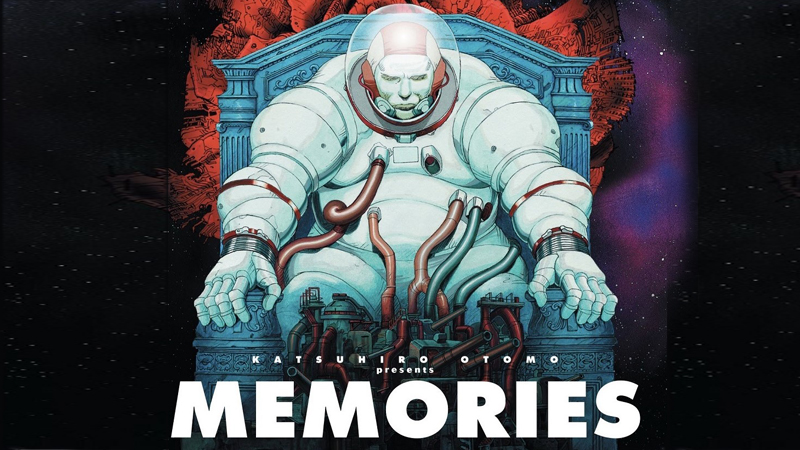
Katsuhiro Otomo permanently cemented himself as a true animation visionary with Akira, and is widely considered one of- if not the- greatest directors working in the medium. While it would be a long time before his return to feature length animation with Steamboy (2004); Otomo was already prolific for his anthology shorts.
Before Akira released, he had already been involved with the masterpieces, Manie-manie and Robot Carnival, having written and directed a few segments. Otomo’s talents extended beyond just drawing and directing; he was proving to be an excellent screenwriter too. Memories would be his third collaborative anthology, and he was going to bring in some heavy hitting talent to develop this new masterpiece.
Satoshi Kon would be writing a segment with Koji Morimoto as director. Otomo does double duty as writer for his directed segment, as well as writing a segment for Tensai Okamura. For years Memories was an elusive anthology, but now it is remastered and has finally been given an English dub and more refined subtitles. This is the definitive release of the third anthology from Katsuhiro Otomo.
Memories (1995) Blu-ray
Studio: Studio 4°C (Magnetic Rose, Cannon Fodder) / Madhouse (Stink Bomb)
Publisher: Discotek Media
Director: Katsuhiro Otomo (Cannon Fodder), Koji Morimoto (Magnetic Rose), Tensai Okamura (Stink Bomb)
Release Date: June 29, 2021
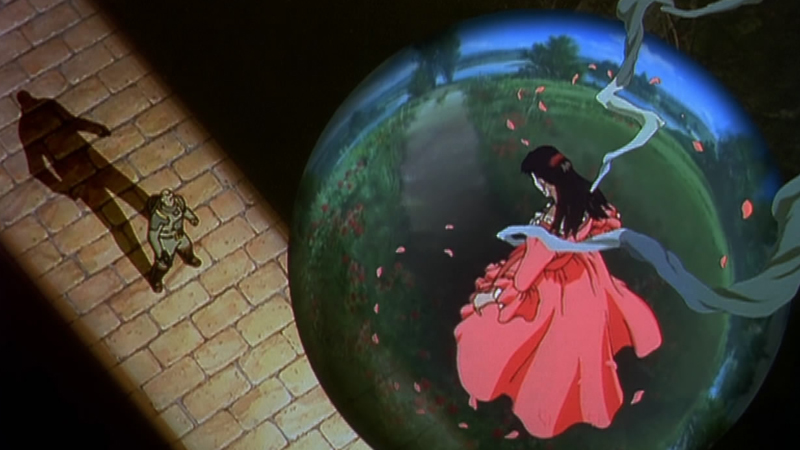
The first segment in Memories is Magnetic Rose, a story developed by Otomo and expanded into a screenplay by Satoshi Kon. This first story is widely considered one of the greatest works of animation and storytelling. Despite it only being 40 minutes, every scene is packed with world building details, and every line of dialogue fleshes out the characters further.
The plot centers on a salvage crew who home in on a distress beacon. When two of the crewmen enter the derelict craft, they not only have to contend with the hauntings of a opera singer, but also the ghosts of their past.
All of Kon’s hallmarks are here. Characters lose their grasp on reality, and even the viewer will be questioning on what is real or not. Subtle clues are established early on and get satisfying pay off later.
This segment is unbelievably tight and thrilling. Koji Morimoto directs, and his style and panache is all over this. While he is mostly known as a key-animator, the man knows how to keep a story moving, and has the bravado to depict realistic zero gravity. Characters will realistically float, and will have unbelievable volume to their form- and this was achieved without the aid of 3D models.
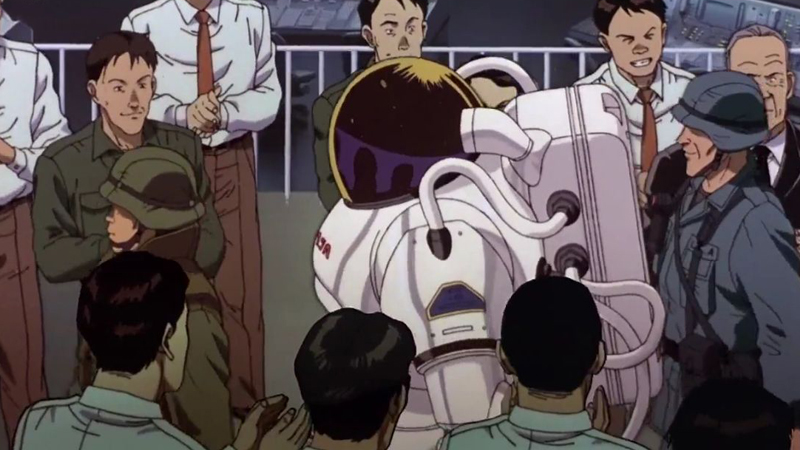
Magnetic Rose does succumb to the use of 3D graphics, but surprisingly the effect is used appropriately. It is relegated to the enormous derelict craft where most of the action is set. The remastering does wonders for the image quality. Every line is sharp and well defined with no pixelation or artifacts. There is absolutely no ghosting, and the black levels are nice and deep.
The ambiance of Magnetic Rose is very 1970s inspired sci-fi. Otomo, Kon, and Morimoto were obviously inspired by Ridley Scott’s Alien for the tone and atmosphere of exploring a mysterious space ship. Kon and Morimoto opt for opera that takes cues from Madama Butterfly, which is very fitting due to the butterfly motif through out.
Most fans of Memories feel that Magnetic Rose is the highpoint of the entire anthology, and for good reason. It is beautiful, layered with deep characters and its masterfully directed. It is so great that it overshadows the next two segments, which are also excellent in their own right, but Magnetic Rose is a tough act to follow.
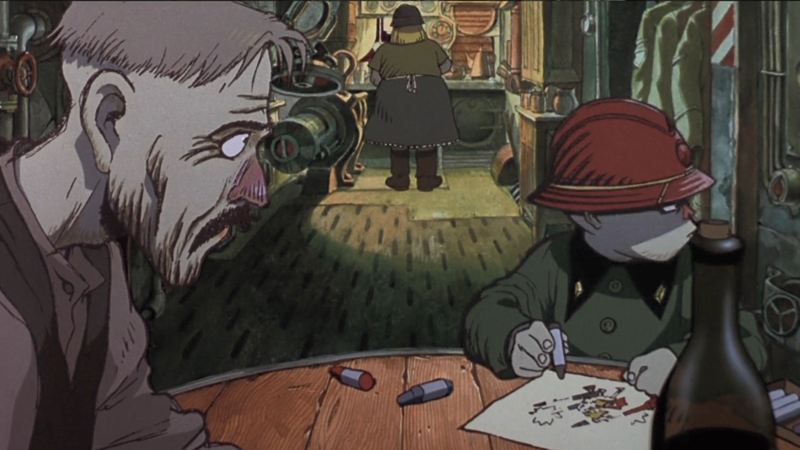
Stink Bomb is the second short of Memories and it is directed by Tensai Okamura with Otomo providing the screenplay. This segment is an unusual one that is primarily a black comedy of errors that surround Nobuo Tanaka, a bumbling lab technician with a cold. After he mistakenly ingests experimental drugs, he becomes a walking bio-weapon that kills everyone who smells his overwhelming odor.
Nobuo is a hapless moron who is completely unaware that he is the cause of all the death surrounding him, and it gets so bad that the US military has to get involved. There is a lot of action and comical chases that involve the world against this lowly schmuck, and it climaxes with a poetically ironic twist that isn’t too hard to see coming.
The animation is impressive, which is to be expected from Okamura who happens to also be the key animator of Ghost in the Shell and Ninja Scroll. His style is excellent at realizing military weapons and action; two things that Stink Bomb has tons of. There is not a lot of substance to this comedic segment, which makes it a poor follow up after the emotional peak of Magnetic Rose.
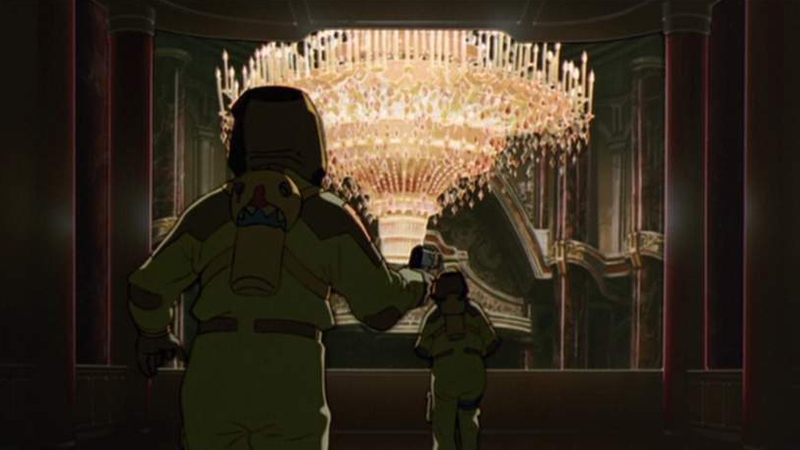
The third and final segment of Memories is Cannon Fodder, written and directed by Katsuhiro Otomo. If Magnetic Rose and Stink Bomb were completely clashing in terms of tone, then Cannon Fodder is even more distant as far as style and tone go. Otomo goes all out with the most unconventional anime short of all time with his segment, which also happens to be the shortest at 15 minutes.
Cannon Fodder has a very experimental art style that can be best described as old timey soviet propaganda cartoons. The characters look really haggard and sickly. Most of the time it is questionable if any of them characters are even human at all, since their gross complexions utterly dank and eyes are completely sunken.
Other than the inspired art style that Otomo experiments with, Cannon Fodder is distinct for being an animation that tells its entire story in one shot. The effect is extremely ambitious; camera dolly movements are simulated as well as tracking crane shots to make the world feel real, and like you are watching a real-time documentary.

Cannon Fodder makes extensive use of complicated multilayered shots to give the illusion of depth, and even relies on some CGI to allow the camera to follow characters through halls. Another effect that is used liberally is smoke and steam that gives the setting its filthy and grimy atmosphere; something that Otomo would go on to perfect in Steamboy.
The story in this segment is very simple- if it can even be called a story at all. Cannon Fodder is an extremely immersive short that depicts the life of a family living in a society that is in a constant state of war with an enemy they have no engagement in.
Every member of society seems to contribute to the city’s armaments in some way; the mother feeds the family and is a part of an all-women crew who make the cannon shells for the city’s innumerable turrets.
The father is some kind of cannon crewman who works with about a dozen guys to load one gigantic shell at a time; and the short agonizes on this process, showing every detail of the procedure and how dangerous it is.
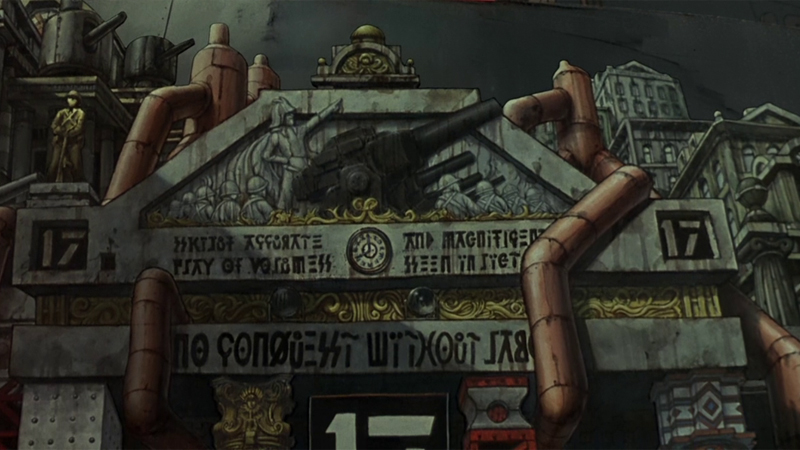
The son of the family is a bright eye’d raggedy moppet who goes to school to be indoctrinated by the state so he can end up like his soul-destroyed father. The boy aspires to be a cannoneer, but the tone and direction of the story suggests that he is doomed to follow in his father’s footsteps, or possibly be killed during an attack.
What is so impressive about Cannon Fodder is how detailed the world building is in a meager 15 minutes. There is a very palpable sense of the kind of world Otomo has crafted. The propaganda strewn about tells so much about the state of things, and the mundanity of the absurd routines the characters endure explains so much without any kind of wordy exposition.
It’s almost Kubrickian how well Otomo can direct with animation. His cold, matter-of-fact style is very grounded and is unlike most modern anime which don’t adhere to coherent camera placement. Otomo’s approach is rarely showy and feels more realistic than most anime directors attempt.

Discotek delivers an excellent Blu-ray for Memories. For years this anthology was hard to come by, and had very rough subtitles that were rushed early on when this movie was being played at festivals. This release polishes up the subs, and makes the reading more natural and flow better.
Since its release in 1995, Memories has never had an English audio track until now. English dubs have come a long way since ’95, and the individuals involved in the localization process for this project had a very clear understanding of the material. They were very thoughtful with the casting and voice direction.
The voice matching in Magnetic Rose is very close, and since the crew were a cast of different nationalities, extra care was given to ensure that specific characters had their respective accents. This was something that couldn’t come across in the Japanese audio.
Stink Bomb has a huge cast of minor extra characters; and the localization team took the effort to cast each and every single one of them to sound unique in English.
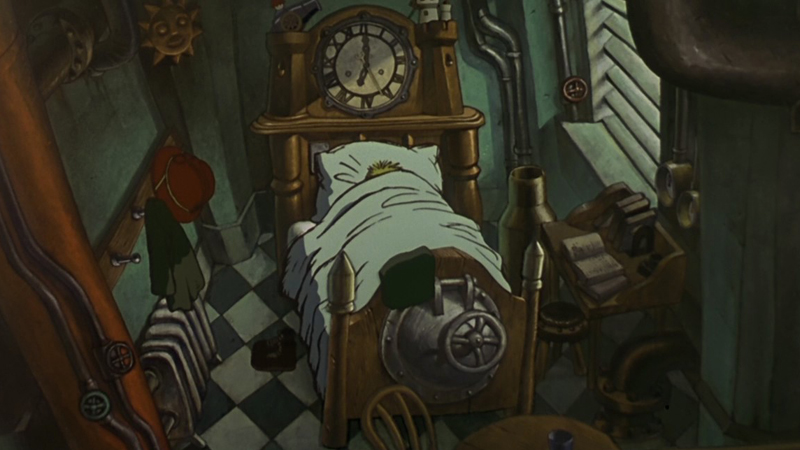
Cannon Fodder and Magnetic Rose both feature child characters, and the English voice directors got actual children to voice their respective characters. There is nothing more off putting than a 30 year old woman trying to sound like a child, and Memories thankfully goes for authenticity.
Memories is an awesome anthology. While it is clear that Magnetic Rose is the winner of the bunch, the proceeding segments should not be ignored. If the order of these were reversed so that Magnetic Rose was the climax of the anthology, perhaps viewers wouldn’t be so dismissive towards Stink Bomb and Cannon Fodder. Ending on Cannon Fodder’s nihilistic ending seems like a mistake.
No matter which way Memories is viewed, the entire package is superb, and a worthwhile viewing experience for appreciators of art and cinema. This is one of the greatest anthology films ever made, and is a great companion to Robot Carnival. Now all we need is for Discotek to remaster Manie-Manie, and the holy trinity of Otomo anthologies will be complete.